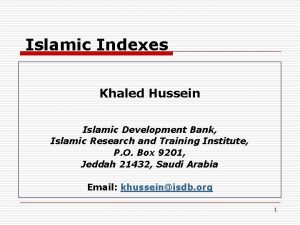Chapter 8 Leading and Motivating Motivation from Islamic














- Slides: 14

Chapter 8 Leading and Motivating

Motivation from Islamic Perspective � Motivation can be define as “that which drives us to action”. It may be one or more intrinsic and extrinsic factors that trigger a desire or need to behave in certain way. The desire usually coupled with a potential consequence either reward or punishment. � Theories on motivation in literature reflect the European world-wide and would not be applicable to the Muslim � Muslim fined their motivation in religion and their cultural heritage. � Muslim worshipping his Lord and this is a powerful motivator in itself irrespectively of any material gain. As a Muslim, Allah is our motivator in our life. � Motivation state that behavior is motivated by natural instincts such as love, attachment, fear or anger. Some say that we are motivated by external rewards for behaving in a certain way or by the need to fulfill internal desires. � By drawn a questions such as, “what’s the point of this? ” or “Why am I here? ” whenever we attempt something and particularly, when we find to be difficult. We want work to be meaningful in the long run, want to feel we’re doing something worthwhile, and we want to feel validated. Allah Almighty has already answered this question for us: � “And I have created the jinn and the men except that they should serve me” (51: 56)

The Sources of Motivation in Islam �Al Quran �The sunnah �The here after �Good companions �Allah’s creation

The motivation of Muslim workers is derived from: �A notion of self fulfillment – become a good people that can contribute to the society, religion and nation �Upward mobility �Uplift of material standards of living – fulfill the need and want of society and prevent poverty �Service to the nation – serve to the country, example army or police and get reward by doing good deeds from Allah.

Believe us as a holder of Amanah on earth, a Muslim must: �Work efforts are a form of ‘amal salih’ which is the key to attainment of true success in this world and well being of hereafter. �Work or task is a form of ‘ibadah’ to Allah as it is conformity with the divine norms and values. �The rewards and punishmentare not confined to this world, but extends to the hereafter.

Motivated Personality �Spiritual inclined person as a Muslim concerned with the following: �Nafs Ammarah – negative motivation due to worries, lack of confidence and do not respect the right of others and normally disobedience to Allah SWT e. g. do not pray etc. �Nafs Lawwamah – self-motivated and view work as challenging, meaningful and opportunity for personal advancement. Normally at this level of motivation still mix with good and bad motivation but quickly realized the mistakes and quickly correct it. �Nafs Mutmainnah – high level of motivation and offers work with full satisfaction purely for the sake of Allah SWT. Treats work as professional and always purifying one’s soul.

Factors for motivation in Islam 1. Drive (the need theory) � A Muslim views matters such as wages and other material benefits as a mean for food, clothing and house for himself and his family. So that he may devote his energy to work 2. Internal stimuli � Human have freedom of choice in behavior or work there are reward for any behavior. � Some people tend to deceive to make behavior appear good. Bad behavior is condemned by God. Good behavior reflects underlying faith. 3. Incentives (external stimuli) � Reward for good behavior is Jannah and bad is Jahannam. � We do believe every work is rewarded. (based on niyyat) 4. Commitment (Ikhlas) � Play a strong role for inner human drive � A muslim character that stimuli motivation: � � Sharafat (sense of losing face) Thawab (reward in hereafter) Karam (generosity) Wafa (fulfillment)

Rewards � Generally that which is given in return for good or evil done received that which is offered or given in return for some service or attainment as for excellence in studies. � In Islamic perspective, a true Muslim with good deeds would be rewarded with good life in this temporary world and rewarded with eternal life in paradise through the pleasure of god/almighty Allah which is the greatest highest reward conferred upon a Muslim with eternal and perpetual life � For example gaining knowledge(study): � In general we achieve good result � In Islamic we get rewarded by pahala because performing Fardu Kifayah � For example in paying zakat: � In general we help those needed, and improve economy � In Islamic we get rewarded(pahala), and purify our property and soul.

Punishment � Generally punishment is a term from Psychological Learning Theory that has a precise meaning it refers to something that causes a behavior to lessen in intensity. There is nothing that is instrinsically punishing. A thing is called punishing if when it is applied. It results in the reduction of behavior that you want to reduce � Islamic perspective, if someone is proven to be guilty of the crime and all the conditions for punishment are fulfilled, there is no leniency or pardon for perpetrator. � Example stealing and robbery: � In Islamic – cut off his or her hands � Generally – jailed for sometimes or fined � Example murder � In Islamic – the law of equality � Generally – imprisonment or death sentence (in some countries)

Leadership �Leadership in Islam definition ‘Lead to achieve an objective and compete to be ahead of others to seek the pleasure of Allah and success in hereafter. Why? �Thus, have We made of you an Ummat justly balanced, that ye might be witnesses over the nations, and the Messenger a witness over yourselves, and We appointed the Qibla to which though was used, only to test those who followed Messenger from those who would turn on their heels (from the Faith). Indeed it was (A change) momentous, except to those guided by Allah. And never would Allah make your faith of no effect. For Allah is too all people Most surely full of kindness. Most Merciful (Al-Baqarah: 143)

Leadership Roles from an Islamic Perspective �According to Islam, the two primary roles of a leader are those of servant-leader and guardian-leader. �First, the leader is the servant of his followers. He is to seek their welfare and guide them towards good. The idea of a leader as a servant has been part of Islam since its beginning. The Prophet Muhammad has emphasized a second major role of the Muslim leader: to protect his community against tyranny and oppression, to encourage God-consciousness and taqwa, and to promote justice: �"A commander (of the Muslims) is a shield for them. " (Muslim) �Whether as servant or as guardian, a Muslim leader may make use of certain bases of power to be effective. Islam recognizes the existence of power, but suggests an etiquette for its use.

Leadership Pre-Requisites 1. Ta’aluq Billah � According to the Quran a person should live and die for ALLAH, and his worship and sacrifices should also be meant for him alone. � "Surely my prayer and my 'sacrifice' my life and my death are all for Allah the Cherisher of the worlds. " (An'am: 162) � "They had been ordered nothing but that they should worship ALLAH with sincere devotion and being true faith to him" (Bayinah: 5) 2. Takwah � - Arabic word which is explained as a shield against wrongdoing and further expounded as to be “conscious of Allah” or to have “fear of Allah” or to be “cautiously aware of Allah”. � - "Fear of God (Taqwa) in the Qur'an, " taqwa is used in the Qur'an over 100 times. In a Quranic context, taqwa refers to fear of God in terms of protecting oneself from displeasing God 3. No desire � Abdurahman ibn samaarah RA said that prophet Muhammad pbuh said, “"Do not seek to be a ruler, for, if you are given it by your asking, then you will be held responsible for it [i. e. Allah will not help you], but if you are given the authority of ruling without your asking for it, then Allah will help you. " Al-Bukhaari: (7147) and Muslim: (1652) � Leadership is the greatest responsibility. If one seeks it, then he is indirectly saying that he has all the abilities to govern over people and he does not need help. But when one is chosen by Allah swt, then that person is the one who will get all the help from Allah swt regarding the matters of deen. In another hadith, Prophet Muhammad pbuh said; � "You people will be keen to have the authority of ruling which will be a thing of regret for you on the Day of Resurrection. What an excellent wet nurse it is, yet what a bad weaning one it is!" Al-Bukhaari: (7148).

Leader Characteristics � The characteristics of an Islamic leader affect his/her behavior, and are congruent with the characteristics of effective leaders identified by Kouzes and Posner (1995). We will now relate the top four characteristics identified by these researchers to the Islamic model. 1; Honesty � � Leaders are considered honest to the extent that there is ‘consistency between word and deed. ’ They do what they say they are going to do. In the Quran, the Prophet Moses (peace be upon him) is himself labeled as “strong and trustworthy” by one of the damsels (as in chapter 28: 26) and the Prophet Joseph (peace be upon him) is described as one who is truthful. (Chapter 12: 46) Similarly, the Prophet Muhammad (peace be upon him) used to be called Sadiq (the truthful) and Amin (the trustworthy) during his youth. Why is honesty and integrity so important with respect to leaders? Although Kouzes and Posner (1987) do not provide the reader with an answer, Islam does. Leadership is more than an assignment or a job; it is a trust—as already pointed out earlier. 2. Competence � People are more likely to follow a leader’s directives if they believe that this person knows what he or she is doing. If followers doubt the capabilities of their leader, they will be less enthusiastic in accepting directions from him. As suggested by Hollander (1978), a leader who is competent in one situation may not be competent in another. � Except in matters where he had received a direct revelation from God, the Prophet Muhammad would often seek and follow the advice of his companions. As the Indian Islamic scholar, Afzalur Rahman indicates: "This enabled all his men to take part in discussion and offer suggestions and in this way the best solution was found by mutual consultation. " (Muhammad, 170) 3 Inspiration � Followers expect their leaders to remain positive about the future no matter how bad the situation may be. The leader must never give up or lose hope. An example of how a leader inspires his followers comes from Abu Bakr. After the death of the Prophet Muhammad, Muslims were in shock. Omar was especially distraught. Abu Bakr calmed him down, and then delivered the following address: � "O People, if you have been worshipping Muhammad, then know that Muhammad is dead. But if you have been worshipping God, then know that God is living and never dies. "

Cont… 4. Patience � In the Quran, God explicitly identifies patience as one of defining characteristics of Islamic leadership: � “And We appointed from among them leaders giving guidance under Our command so long as they persevered with patience and continued to have faith in Our Signs. ” (As-Sajdah 32: 24) � Indeed, like all other believers, a leader can expect to be tested, and he will need to endure. The example of the Prophet and early converts to Islam during the boycott of the Muslims in Makkah illustrates the need for patience. 5. Humility � A Muslim leader is to be humble, and must never let his ego get the better of him. Omar, the second Caliph, lived in a simple house. He had no bodyguards for his personal security, and walked the streets of Madinah without any escort. Ali, in his letter to Malik Al-Ashtar an-Nukhai, strongly encourages him to remain humble in his new position as Governor of Egypt, and explains to him why pride and arrogance are to be avoided: � “Never say to yourself, ‘I am their Lord, their ruler […], and I must be obeyed submissively and humbly. ’ Such a thought will unbalance your mind, will make you vain and arrogant, will weaken your faith in religion and will make you seek the support of any power other than God’s […]. ” (To the Commander, 8) � The following story demonstrates how the Prophet exhibited patience and humility when a ban was imposed on the Muslims by others: � "When we complained to God's Messenger (peace be upon him) of hunger and raised our clothes to show we were each carrying a stone over the belly, God's Messenger (peace be upon him) raised his clothes and showed that he had two stones on his belly. " (At Tirmidhi) 6. The willingness to seek consultation � Islam stresses consultation in all affairs. Through the Quranic phrase amruhum shura baynahum and the Prophet’s habit of seeking and accepting advice, the limits on the exercise of power have been set both by the Quran and the Prophet. As Al. Buraey points out, shura (consultation) plays a critical role in administration and management, specifically with respect to decision-making; it provides a restraint on a leader’s administrative power and authority.
 Palatable
Palatable Bobbin leading principle
Bobbin leading principle Chapter 10 motivating and satisfying employees and teams
Chapter 10 motivating and satisfying employees and teams Chapter 10 motivating and satisfying employees and teams
Chapter 10 motivating and satisfying employees and teams Motivation in islamic perspective
Motivation in islamic perspective Leading through motivation
Leading through motivation Norm althouse
Norm althouse Chapter 10 motivating employees
Chapter 10 motivating employees Chapter 10 motivating employees
Chapter 10 motivating employees Motivating and satisfying employees and teams
Motivating and satisfying employees and teams Motivating and satisfying employees and teams
Motivating and satisfying employees and teams Copyright
Copyright Motivating yourself and others
Motivating yourself and others Motivating parallelism
Motivating parallelism Motivating students to learn english
Motivating students to learn english



























